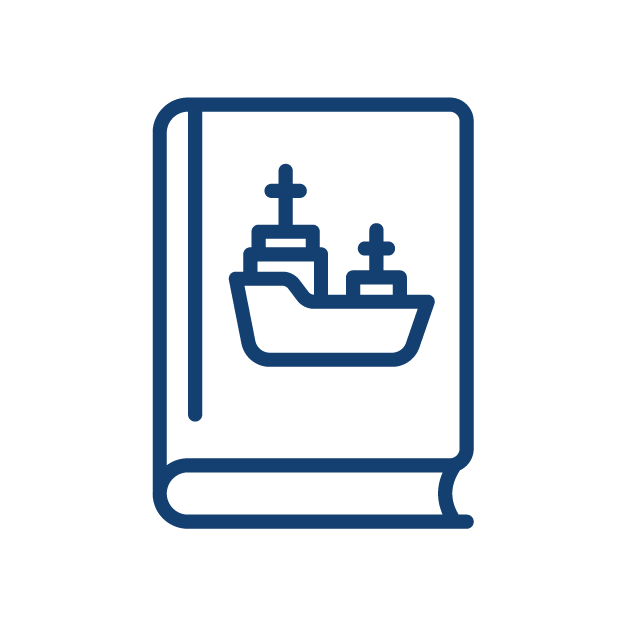Maritime Academies
Home / Training / Maritime Academies

Naval
Academies
These academies specifically train individuals for careers in the navy. They provide education and training in leadership, navigation, engineering, and other disciplines required for naval officers.

Merchant Marine
Academies
These academies prepare individuals for careers in the merchant marine, but graduates may also serve in the navy. Training includes navigation, engineering, and other skills relevant to maritime professions.

Naval Reserve Officer Training Corps (NROTC) Programs
NROTC programs are offered at universities & colleges, providing education & training for individuals who aspire to become naval officers. Students may receive education while pursuing degrees in various academic disciplines.

Maritime Training Institutes
These institutes focus on providing specialized training for maritime professions, including navigation, engineering, & catering staff. While not navy-specific, graduates may find employment in various maritime sectors, including navy.

Naval Engineering Schools
These schools may specialize in providing engineering education and training for individuals seeking careers as naval engineers, preparing them for roles related to the design, maintenance, and operation of naval vessels.

Naval Aviation Schools
Specialized schools that focus on training individuals for careers in naval aviation. This includes the training of pilots, navigators, and other personnel associated with naval aviation.
Things You Should Know About Maritime Academies
Looking to chart your course on the open seas? Batten down the hatches and prepare to set sail, landlubber. Whether you dream of a life on the ocean waves or just want to dip your toes in Davy Jones’ Locker, picking the right maritime academy is key. From the seven seas to the five oceans, reputable academies span the globe that’ll shape you into a true seafaring salt.
You’ve always loved the open ocean and dreamed of a career at sea. But what exactly do those who work aboard ships need to know? It turns out that maritime academies cover a wide range of subjects to prepare cadets for life on the waters. You’ll dive into maritime history and ethics, oceanography, marine engineering, maritime law, shipping and port management, marine biology, navigation, and insurance.
Academies also teach leadership, operations, safety, logistics, contracts, offshore energy, surveying, and more. Some even offer specialized courses on tugboats or security. With such a broad curriculum, maritime academies aim to produce knowledgeable, competent, and ethical mariners ready to ship out and take the helm. This multifaceted education ensures you’ll be sea-ready, whether your ultimate destination is the bridge, the engine room, or the wheelhouse.
An Overview of Maritime Academies
Maritime academies offer specialized education and training for careers in the maritime industry. They teach both practical skills and theoretical knowledge related to marine operations, transportation, and commerce.
At a maritime academy, you’ll take a variety of required courses covering topics like:
– Maritime history
– Marine engineering
– Oceanography
– Navigation
– Shipping and port management
You may also choose electives in areas that interest you, such as:
– Maritime law
– Marine biology
– Maritime ethics
– Marine information systems
Some academies offer programs focused on specific maritime sectors, including:
– Marine engineering technology
– Maritime business administration
– Marine transportation
– Naval architecture
Students can earn undergraduate or graduate degrees, including bachelor’s degrees in marine engineering, marine transportation, and naval architecture. Maritime academies also offer certifications and continuing education for mariners.
The curriculum at a maritime academy provides a mix of classroom learning and hands-on training. Students complete coursework in navigation, seamanship, and ship operations. They also gain experience through internships, cadet cruises, and simulated scenarios.
Maritime academies aim to prepare students for successful careers as licensed officers, captains, naval architects, and executives in the maritime industry. If you’re interested in a career at sea or in a related field, attending a maritime academy is a great place to start.


Core Curriculum at Maritime Academies
Maritime academies offer a variety of majors focused on maritime studies. The core curriculum provides you a solid foundation in the field. You’ll take classes in:
Maritime history: Study how ships, navigation, and trade have evolved over time. Learn about famous explorers, naval battles, and key innovations.
Marine engineering: Gain an understanding of ship systems, including propulsion, electrical, and HVAC systems. Learn how to operate, maintain, and repair marine equipment.
Nautical science: Study the principles of ship handling, navigation, and seamanship. Learn essential skills like chart plotting, meteorology, and safety procedures.
Marine transportation: Examine the flow of cargo and people by sea. Discuss topics such as port management, intermodal transportation, and maritime policy.
In addition to the core classes, maritime academies offer concentrations in areas like marine biology, marine environmental science, international maritime business, and naval architecture. You can pursue bachelor’s and master’s degrees, as well as certifications and endorsements.
Field experiences, like internships, are often a requirement. Some academies operate training ships that allow students to get hands-on experience during sea terms. Graduates are prepared for careers as deck officers, marine engineers, port managers, and more.
If spending your days at sea or working in the maritime industry sounds exciting, attending a maritime academy may be a perfect choice for you. With a combination of classroom learning and real-world experience, you’ll gain the knowledge and skills to launch your career.
Specialized Programs in Maritime Academies
Maritime academies offer specialized programs for those interested in particular areas of the maritime industry. If you have a passion for a specific maritime career path, check out the focused programs at various academies.
Many academies provide programs in marine engineering, preparing you to work as a ship’s engineer. These intensive programs teach marine electrical systems, propulsion plants, auxiliary systems, and more. Graduates are well-equipped to work as third assistant engineers.
Several academies also offer programs in marine transportation, readying you for a career as a ship’s deck officer. Coursework includes navigation, cargo handling, meteorology, and maritime law. After sea time and testing, you can become a licensed third mate.
Other specialized programs include naval architecture and marine engineering, maritime law, and global logistics and maritime management. The latter covers international trade, intermodal transportation, and supply chain management.
Certain academies provide programs for those interested in shipboard firefighting, maritime security, and emergency management. These teach critical skills required for several maritime careers.
Some academies even offer programs focused on inland waterways, the offshore oil industry, passenger cruise operations, or the fishing industry. The options for specialized maritime education are numerous.
Whatever your maritime interests, check with academies to find programs tailored to your needs. In these focused programs, you’ll gain valuable knowledge and experience to start your dream career. The maritime world has a place for people of all passions and talents. Let the academy programs guide you to your perfect fit.

Preparing for a Career at Sea
To prepare for a career in the maritime industry, there are some key steps you should take. Enrolling in a maritime academy is one of the best ways to gain the knowledge and experience needed for many seafaring roles.
At a maritime academy, you’ll take a variety of courses covering important maritime topics. This includes learning about ship operations, safety procedures, navigation, and maritime law. You’ll also get hands-on training aboard training ships to prepare you for life at sea. The connections and networking opportunities at maritime academies can lead to exciting internships and job opportunities after graduation.
In addition to your coursework, make sure to stay physically fit. Careers at sea often require a lot of stamina, strength, and endurance. Maintain a regular exercise routine to ensure you meet the physical requirements for jobs on ships, oil rigs, and other offshore locations.
You should also consider earning additional certifications to boost your career prospects. Some useful certs for mariners include:
Basic Safety Training – Covers firefighting, first aid, and water survival. Required for most seafaring roles.
Radar Observer – Allows you to operate a ship’s radar equipment. Useful for deck officers and captains.
Global Maritime Distress and Safety System – Teaches you to operate emergency communication equipment. Required for radio officers and deck officers.
Security Training – Provides anti-piracy and security awareness training. Increasingly important for careers at sea.
With the right education, training, and dedication, you can have a successful career in the maritime industry. The opportunities are vast, from working on cargo ships and cruise liners to offshore oil platforms. Prepare well, work hard, and the sea can take you anywhere.
Frequently Asked Questions About Maritime Academies
Have questions about maritime academies? Here are some of the most common FAQs:
What kind of degrees do maritime academies offer?
Maritime academies offer undergraduate and graduate degrees, including bachelor’s and master’s degrees in majors like marine transportation, marine engineering, and marine science. Some academies also offer associate’s degrees and professional certifications.
Do I need experience at sea to attend a maritime academy?
No, maritime academies accept students with little to no experience at sea. Many cadets start their education with the fundamentals. However, having some experience can be helpful. Some academies may require a certain number of days at sea before graduating.
How much does it cost to attend a maritime academy?
Tuition and fees vary between academies. Most are public colleges with in-state and out-of-state tuition rates. Tuition is often lower than other private colleges. Some academies provide scholarships, grants and financial aid for cadets.
What careers can I pursue after graduating from a maritime academy?
Graduates of maritime academies have many career options, including:
Merchant marine officer: Captains, mates, and engineers on cargo and cruise ships.
Port captain: Oversees port operations and ship traffic.
Marine surveyor: Inspects and evaluates the condition of ships and marine equipment.
Salvage master: Leads operations to rescue ships in distress and recover sunken vessels.
Naval architect: Designs ships and marine structures.
Marine ecologist: Studies the impact of maritime operations on marine environments.
Attending a maritime academy opens up opportunities for rewarding careers in the marine industry. If you have a passion for ships, the sea, and maritime operations, a maritime academy education can be very fulfilling.
Undoubtedly, maritime academies cover a wide range of subjects related to the maritime industry. Whether you want to work on the ships, in the ports, or in a corporate maritime office, a maritime academy education can set you on the right course. With so many areas to specialize in, you’re bound to find something that floats your boat. Just don’t forget that apart from learning technical skills, you’ll also gain leadership, teamwork, and communication skills that are invaluable in any career. Weigh up all the options carefully to plot the best voyage for your future. Fair winds and following seas.
